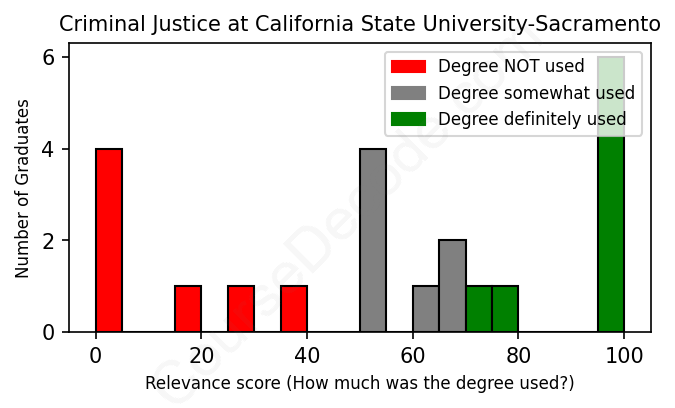
First, some facts. Of the Criminal Justice graduates from California State University-Sacramento we've analyzed , here's how many have used (or NOT used) their degree in their career:

These are estimates based on AI analysis of 22 LinkedIn profiles (see below).
The verdict? Significantly below average. Overall, with an average relevance score of 55%, Criminal Justice graduates from California State University-Sacramento have a much lower likelihood (-12%) of finding work in this field compared to the average graduate across all fields:
And for comparison, here's the chart for all profiles we've looked at across all degrees.
Also, after graduating, 36% of these graduates have pursued further education other than another Bachelor's degree (such as a Masters degree or other), compared to the average across all profiles of 35%. This suggests you may need more than just a Bachelors degree to be competitive as a Criminal Justice graduate.
See the details:
|
Relevance score: 100% We think this person has gone into a career highly relevant to their degree. We think this person has gone into a career highly relevant to their degree.
DEGREE INFOGraduated in 2021 from California State University-Sacramento with a Bachelors of Science in Criminal Justice. No other secondary education since. JOB HISTORY SINCE GRADUATIONInvestigations VRC Investigations Aug 2022 - Present ABOUTNo information provided. |
The top 10 most common jobs done by the graduates we've analyzed (ranked most common to least) are:
From the analysis of various LinkedIn profiles, it seems that a significant number of graduates with a Criminal Justice degree from California State University-Sacramento have pursued careers closely tied to the legal field. Roles such as Legal Interns, Certified Law Students, and positions in District Attorneys' offices dominate the data, showcasing a strong inclination toward jobs that require direct application of criminal justice principles. Many of the graduates have secured positions as Deputy District Attorneys, Associate Attorneys, and even roles within public defense, which heavily incorporate the knowledge and skills they acquired during their studies. These roles are definitely relevant to a Criminal Justice degree, as they're grounded in the legal system and often involve advocacy, legal research, and direct client interaction.
On the flip side, there are quite a few graduates who veer off into positions that aren't directly related to criminal justice. Many have taken on jobs in customer service, sales, and administrative functions, which tend to lack a clear connection to their degree. For instance, roles like Retail Manager, Server, or even as a Mortgage Sales Coordinator appear to stray quite far from the core competencies of a criminal justice education. Overall, while many graduates have found fulfilling paths directly linked to criminal justice, there is also a notable proportion that has taken on opportunities in unrelated fields, either by choice or circumstance. This highlights the varied career paths available but suggests that not all graduates have managed to connect their education directly to their jobs post-graduation."
Here is a visual representation of the most common words in job titles for Criminal Justice graduates (this is across all Criminal Justice graduates we've analyzed, not just those who went to California State University-Sacramento):

It looks like graduates from California State University-Sacramento's Criminal Justice program have had a pretty varied set of career paths, which is not uncommon for this field. Right after graduation, many of them tend to land roles that are directly related to law and legal support, such as legal interns or positions in public defender's offices—these are great for gaining hands-on experience and making connections. For example, one graduate shifted from being a legal intern to becoming a Deputy District Attorney fairly quickly, which shows that there are pathways available for those interested in pursuing a legal career.
However, it’s also notable that not everyone sticks to a straight path in criminal justice. Some graduates have taken roles quite different from their studies. For instance, some have ended up in customer service, sales, or even roles in pest control—jobs that seem a bit disconnected from the criminal justice theme. Looking at where people are five or ten years later, many do remain in the legal field, moving up the ranks to positions like attorney or public defender. But there’s also a significant number who diversify significantly or take jobs that aren't directly related—this could suggest the job market is quite competitive or that these grads explored various interests over time. Overall, while many are doing well in relevant fields, there's a mixed bag, with some finding success in unexpected areas too.
Getting a Bachelor’s degree in Criminal Justice at California State University-Sacramento is generally considered to be on the easier side compared to some other majors, but it definitely has its challenges. You’ll dive into a mix of topics like criminal law, criminology, and ethics, which can be super interesting but also requires you to think critically and write a fair bit. The workload is manageable for most, especially if you stay organized and motivated, but you’ll still need to engage with the material and keep up with readings and projects. So, if you're passionate about the subject and ready to put in the effort, it can be a rewarding experience without being overwhelmingly tough.
Most commonly, in the LinkedIn profiles we've looked at, it takes people 2 years to finish a Bachelor degree in Criminal Justice.
Looking at the job histories of these Criminal Justice graduates from California State University-Sacramento, it seems like most of them have started on a pretty solid path, with a mix of internships and entry-level positions that lead to more stable careers. Those who landed roles like Deputy District Attorney or Assistant Public Defender tend to have a better chance of making good money, while others in less specialized roles (like customer service or admin positions) might not be raking it in as much. The salaries in the legal field can really vary, but overall, it seems like some of these grads are likely making decent money, especially as they gain more experience. It’s all about climbing that ladder and finding the right niche in the criminal justice system!
Here is a visual representation of the most common words seen in the "about" section of LinkedIn profiles who have a Bachelor degree in Criminal Justice (this is across all Criminal Justice graduates we've analyzed, not just those who went to California State University-Sacramento). This may or may not be useful:

Here are all colleges offering a Bachelor degree in Criminal Justice (ordered by the average relevance score of their Criminal Justice graduates, best to worst) where we have analyzed at least 10 of their graduates: